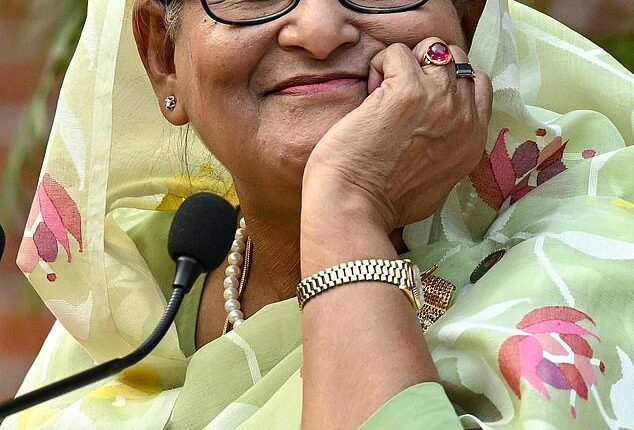Bangladesh’s former Prime Minister Sheikh Hasina has been found guilty of crimes against humanity and sentenced to death.
A special tribunal found she was responsible for ordering a violent crackdown on student-led protests last year, during which the UN estimates up to 1,400 people died, most by gunfire from security forces.
Hasina, 78, was tried in her absence as she is living in exile in India, where she has been since being forced from power.
A three-judge bench of the country’s international crimes tribunal convicted Hasina of crimes including murder, extermination, torture and other inhumane acts.
Reading the verdict to the court, Justice Golam Mortuza Mozumder said the ‘accused prime minister committed crimes against humanity by her order to use drones, helicopters and lethal weapons’.
Hasina had pleaded not guilty to the charges and alleged the tribunal was a ‘politically motivated charade’.
Security was ramped up across Bangladesh on Monday morning due to fears of protest, as family members of those killed during the 2024 uprising broke down in tears in the Dhaka courtroom.
A death sentence was also handed to the former home minister, Asaduzzaman Khan, her co-accused in the trial, for crimes against humanity.

Bangladesh’s former Prime Minister Sheikh Hasina has been found guilty of crimes against humanity and sentenced to death

A man holds a poster in front of the court demanding the capital punishment ahead of the verdict on charges of crimes against humanity for a deadly crackdown on student-led protests in 2024 against the ousted Prime Minister Sheikh Hasina
The court also sentenced ex-police chief Chowdhury Abdullah Al-Mamun to five years in prison. He was awarded leniency for his contribution to the trial, including ‘material evidence to the tribunal to arrive at the correct decision’.
Hasina, physically absent from the trial, remained defiant in an audio message recorded prior to the verdict.
‘Let them announce whatever verdict they want. It doesn’t matter to me. Allah gave me this life and only he can end it. I will still serve my people,’ she said.
As the sentences were announced, cheers and applause erupted both inside and outside the court, as a small group of people chanted for the guilty to be hanged.
The Bangladeshi capital remained highly vigilant in the run-up to the historic decision, with paramilitaries cordoning off the tribunal area and police ordered to ‘shoot-on-sight’ if anyone was found setting fire to vehicles or using explosives.
At least 30 crude bomb explosions and 26 vehicles have been torched across the country over the past few days, according to reports.
The protest that led to Hasina’s downfall started as a student movement but escalated into a nationwide uprising, which as now been dubbed the ‘July revolution’, against her authoritarian rule.
According to a United Nations report, up to 1,400 people may have been killed during the protests between July 15 and August 5, 2024, with thousands more injured – most of them by gunfire from security forces – in what was the worst violence in Bangladesh since its 1971 war of independence.
During the trial, prosecutors told the court they had uncovered evidence of Hasina’s direct command to use lethal force to suppress the student-led uprising.

Fires were lit in the streets of Dhaka as anti-quota protesters clashed with the police on July 18, 2024

A police officer is beaten by mob during a clash between anti-quota supporters, police and Awami League supporters at the Rampura area in Dhaka, Bangladesh, July 18, 2024

Police in riot gear detain a man who was refusing to leave the University of Dhaka premises

Anti-quota supporters clash with police and Awami League supporters at the Rampura area in Dhaka, Bangladesh, July 18, 2024
The court said the attacks during the protests last year were ‘directed against the civilian population’, and ‘widespread and systematic’.
‘Therefore, in the atrocities of killing and gravely injuring protesters, as aforesaid, accused Prime Minister Sheikh Hasina committed crimes against humanity by her incitement order and also failure to take preventive and punitive measures under Charge 1,’ it said.
‘Accused Sheikh Hasina committed one count of crimes against humanity by her order to use drones, helicopters and lethal weapons under Charge number 2,’ the court added.
Her decade-and-a-half in power were viewed as a deadly reign of terror by many across Bangladesh as she was associated with corruption, torture and enforced disappearances, which were all documented by the United Nations as well as several human rights organisations.
Hasina’s lawyers have criticised the trial and last week appealed to the United Nations Special Rapporteur on extrajudicial, summary or arbitrary executions, citing ‘serious concerns’ over due process and fair trial rights.
Monday’s sentencing has raised fears of fresh political turmoil ahead of national elections expected in February.
This is a breaking news story. More to follow.








